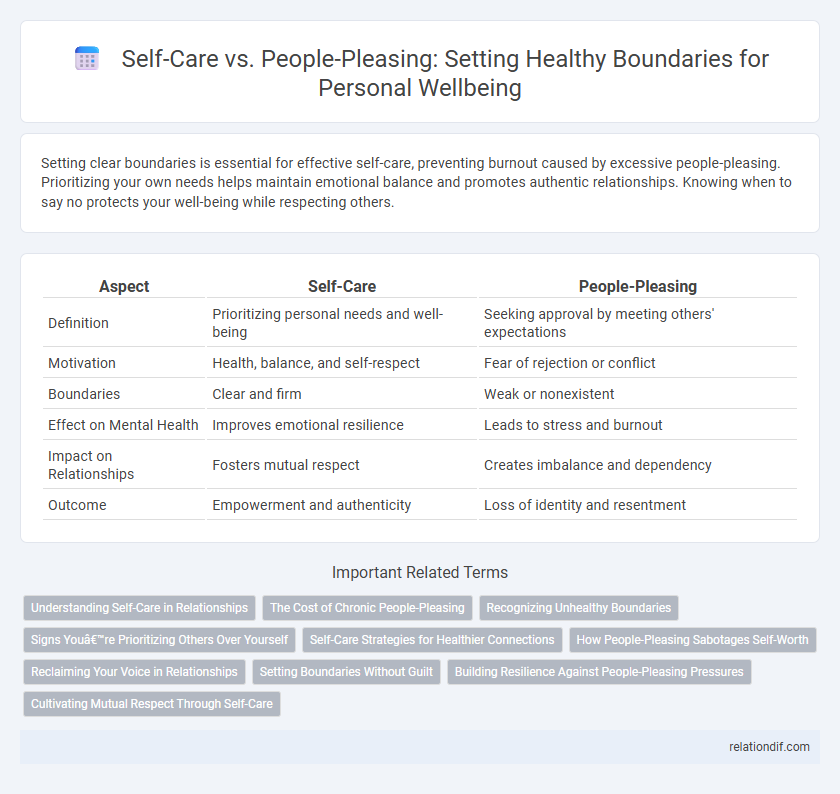Setting clear boundaries is essential for effective self-care, preventing burnout caused by excessive people-pleasing. Prioritizing your own needs helps maintain emotional balance and promotes authentic relationships. Knowing when to say no protects your well-being while respecting others.
Table of Comparison
| Aspect | Self-Care | People-Pleasing |
|---|---|---|
| Definition | Prioritizing personal needs and well-being | Seeking approval by meeting others' expectations |
| Motivation | Health, balance, and self-respect | Fear of rejection or conflict |
| Boundaries | Clear and firm | Weak or nonexistent |
| Effect on Mental Health | Improves emotional resilience | Leads to stress and burnout |
| Impact on Relationships | Fosters mutual respect | Creates imbalance and dependency |
| Outcome | Empowerment and authenticity | Loss of identity and resentment |
Understanding Self-Care in Relationships
Setting clear boundaries in relationships is essential for effective self-care, ensuring personal needs are met without sacrificing emotional well-being. Prioritizing self-care helps prevent patterns of people-pleasing that often lead to burnout, stress, and resentment. Understanding the balance between nurturing oneself and honoring commitments creates healthier interactions and promotes mutual respect.
The Cost of Chronic People-Pleasing
Chronic people-pleasing often leads to emotional exhaustion and diminished self-worth, as individuals prioritize others' needs over their own. This behavior can result in burnout, anxiety, and compromised mental health, undermining effective self-care practices. Establishing healthy boundaries is essential to reclaim personal energy and foster sustainable well-being.
Recognizing Unhealthy Boundaries
Recognizing unhealthy boundaries is crucial for maintaining mental and emotional well-being, as blurred limits often lead to people-pleasing behaviors that sacrifice self-care. These unhealthy boundaries manifest when individuals prioritize others' needs at the expense of their own, resulting in stress, burnout, and diminished self-worth. Setting clear, respectful boundaries fosters a balanced approach where self-care is not compromised by the desire for approval or validation from others.
Signs You’re Prioritizing Others Over Yourself
Neglecting personal needs to meet others' expectations often leads to exhaustion and resentment, clear signs of prioritizing others over yourself. Consistently saying yes to requests despite feeling overwhelmed indicates a lack of healthy boundaries crucial for self-care. Recognizing emotional depletion and persistent guilt reveals the imbalance between people-pleasing tendencies and necessary self-prioritization.
Self-Care Strategies for Healthier Connections
Establishing clear boundaries through self-care strategies enhances emotional well-being and fosters healthier connections by preventing burnout and resentment. Prioritizing personal needs like regular mindfulness, setting time limits, and assertive communication helps maintain balance between helping others and preserving energy. These practices support authentic relationships grounded in mutual respect rather than motivated by people-pleasing behaviors.
How People-Pleasing Sabotages Self-Worth
People-pleasing undermines self-worth by prioritizing others' approval over personal needs, leading to emotional exhaustion and loss of identity. Consistently saying yes to others can create boundaries that favor external validation, eroding self-respect. Establishing clear boundaries is essential for maintaining self-care and rebuilding authentic self-esteem.
Reclaiming Your Voice in Relationships
Reclaiming your voice in relationships involves setting clear, consistent boundaries that prioritize your well-being over the need to please others. Emphasizing self-care means recognizing your emotional limits and confidently expressing your needs without guilt. This shift fosters healthier connections and empowers you to maintain authenticity instead of sacrificing personal values to gain approval.
Setting Boundaries Without Guilt
Setting boundaries without guilt empowers individuals to prioritize their well-being while maintaining healthy relationships. Clear, assertive communication helps distinguish self-care from people-pleasing by honoring personal limits without sacrificing empathy. Embracing boundaries fosters emotional resilience and prevents burnout, reinforcing a balanced, respectful dynamic in all interactions.
Building Resilience Against People-Pleasing Pressures
Establishing clear boundaries is essential for building resilience against people-pleasing pressures, as it helps maintain mental and emotional well-being. Practicing self-care routines such as mindful reflection and assertive communication empowers individuals to prioritize their needs without guilt. Consistent boundary-setting reduces stress and reinforces a healthy sense of self, enabling sustainable personal growth.
Cultivating Mutual Respect Through Self-Care
Cultivating mutual respect through self-care involves setting clear boundaries that honor personal needs while acknowledging others' feelings. Prioritizing self-care reduces people-pleasing behaviors, fostering authentic relationships based on understanding and equality. Establishing these boundaries encourages open communication and reinforces respect for individual well-being.
self-care vs people-pleasing Infographic

 relationdif.com
relationdif.com